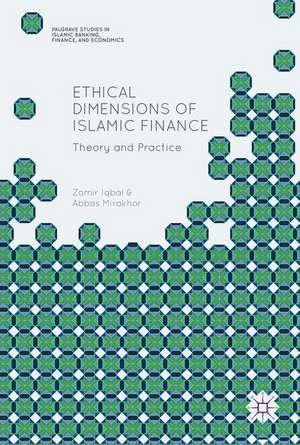Ethical Dimensions of Islamic Finance: Theory and Practice: Palgrave Studies in Islamic Banking, Finance, and Economics
Autor Zamir Iqbal, Abbas Mirakhoren Limba Engleză Hardback – 6 oct 2017
| Toate formatele și edițiile | Preț | Express |
|---|---|---|
| Paperback (1) | 692.56 lei 6-8 săpt. | |
| Springer International Publishing – 22 iun 2018 | 692.56 lei 6-8 săpt. | |
| Hardback (1) | 696.35 lei 6-8 săpt. | |
| Springer International Publishing – 6 oct 2017 | 696.35 lei 6-8 săpt. |
Din seria Palgrave Studies in Islamic Banking, Finance, and Economics
- 18%
 Preț: 774.52 lei
Preț: 774.52 lei - 15%
 Preț: 693.25 lei
Preț: 693.25 lei - 11%
 Preț: 641.75 lei
Preț: 641.75 lei - 15%
 Preț: 642.68 lei
Preț: 642.68 lei -
 Preț: 388.72 lei
Preț: 388.72 lei - 18%
 Preț: 786.18 lei
Preț: 786.18 lei - 15%
 Preț: 648.74 lei
Preț: 648.74 lei -
 Preț: 223.67 lei
Preț: 223.67 lei - 18%
 Preț: 895.89 lei
Preț: 895.89 lei - 18%
 Preț: 899.21 lei
Preț: 899.21 lei - 15%
 Preț: 636.94 lei
Preț: 636.94 lei - 15%
 Preț: 637.25 lei
Preț: 637.25 lei - 15%
 Preț: 641.38 lei
Preț: 641.38 lei - 15%
 Preț: 696.35 lei
Preț: 696.35 lei - 18%
 Preț: 788.22 lei
Preț: 788.22 lei - 15%
 Preț: 640.24 lei
Preț: 640.24 lei
Preț: 696.35 lei
Preț vechi: 819.23 lei
-15% Nou
Puncte Express: 1045
Preț estimativ în valută:
133.25€ • 142.49$ • 111.10£
133.25€ • 142.49$ • 111.10£
Carte tipărită la comandă
Livrare economică 17 aprilie-01 mai
Preluare comenzi: 021 569.72.76
Specificații
ISBN-13: 9783319663890
ISBN-10: 3319663895
Pagini: 192
Ilustrații: XV, 192 p. 3 illus. in color.
Dimensiuni: 148 x 210 mm
Greutate: 0.4 kg
Ediția:1st ed. 2017
Editura: Springer International Publishing
Colecția Palgrave Macmillan
Seria Palgrave Studies in Islamic Banking, Finance, and Economics
Locul publicării:Cham, Switzerland
ISBN-10: 3319663895
Pagini: 192
Ilustrații: XV, 192 p. 3 illus. in color.
Dimensiuni: 148 x 210 mm
Greutate: 0.4 kg
Ediția:1st ed. 2017
Editura: Springer International Publishing
Colecția Palgrave Macmillan
Seria Palgrave Studies in Islamic Banking, Finance, and Economics
Locul publicării:Cham, Switzerland
Cuprins
1. Ethics and Finance.- 2. Moral Sense and Ethics in Economics and Finance.- 3. Key Virtues of Business Ethics in Islam.- 4. Business Ethics in Islam.- 5. Ethical Dimensions of Islamic Economics and Finance.- 6. Sacralising Finance: Risk-Sharing Islamic Finance.- 7. Ethical and Responsible Finance for Development.
Notă biografică
Zamir Iqbal is VP Finance and CFO of the Islamic Development Bank. Prior to this role, he served as head of the World Bank's Global Islamic Finance Development Center in Turkey. He is a coauthor of Challenges in Economic and Financial Policy Formulation (2014) and a coeditor of the Palgrave Studies in Islamic Banking, Finance, and Economics series.
Abbas Mirakhor is the First Holder of Islamic Finance Chair at INCEIF - The Global University of Islamic Finance, Malaysia. He is a coauthor of Challenges in Economic and Financial Policy Formulation (2014), Introduction to Islamic Economics (2015), and Intermediate Islamic Finance
Abbas Mirakhor is the First Holder of Islamic Finance Chair at INCEIF - The Global University of Islamic Finance, Malaysia. He is a coauthor of Challenges in Economic and Financial Policy Formulation (2014), Introduction to Islamic Economics (2015), and Intermediate Islamic Finance
Textul de pe ultima copertă
This book provides an introductory theoretical foundation of the ethics embedded in Islamic economics and finance, and it shows how this ethical framework could pave the way to economic and social justice. It demonstrates how Islamic finance—a risk-sharing and asset-backed finance—has embedded universal values, ethical rules, and virtues, and how these qualities may be applied to a supposedly value-neutral social science to influence policy-making. This book argues that ethical and responsible finance, such as Islamic finance, could lead the efforts to achieve sustainable economic development. Iqbal and Mirakhor then conduct a comparative analysis of Islamic and conventional financial systems and present Islamic finance as an alternative that can address today’s growing problems of inequality, social injustice, financial repression, unethical leadership, and lack of opportunity to share prosperity.
Caracteristici
Highlights the significance of ethics in economics and finance for betterment of society Presents perspective from Islam, including the principles of virtues of justice and risk-sharing Raises growing concerns of a debt-dominated and leveraged economy and the social and economic cost of ignoring responsible finance
